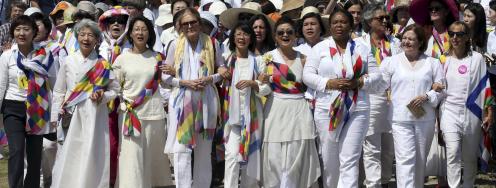Not your Daddy's North Korea?
Kim Jong Il is dead. While for many this may seem like a day long planned, now that it is upon us it is no less frightening.
A reclusive nation of some 23 million people with a small cache of nuclear weapons and formidable firepower aimed directly at Seoul has lost its "Dear Leader". It's a nation that has known only two leaders in the past 60 odd years. Unsettling to say the least. The question for many will be what can and should the U.S. do during this uneasy transition?
First, we must be clear about the situation. Yes, this is big. The nation has been under the tight grip of a clear dynansty and family dictatorship since World War II and the descendants of Kim Il Sung seem to remain firmly in control. As little as we know about how the DPRK works we have been shown over the past 2 1/2 years that there is a clear transition process in place. His son, Kim Jong Un has been selected as the next leader, and he has been given increasing responsiblity and visibility over the past years.
It is not a chaotic or free for all situation - quite the opposite. Clear roles have been assigned and authority transferred. Complete? No, but no such transition is ever final until it happens. Recent increases in relationships with China would indicate that Beijing - which treasures stability above all else - is invested in a safe and secure outcome to this story. So the carpet hasn't been pulled out from under the regime - but the floor is slippery.
Second, while there is no need to panic, there is reason to be vigilant - and involved. As much as the nuclear situation has already been demandIng additional engagement, a transition of power will demand it even more. Regional stability, future security, and the nuclear program's status and future are all in play now to an even greater extent. The U.S. must find creative, non-threatening, and durable ways to engage with the DPRK. We must work with Seoul, Tokyo and Beijing to calm immendiate concerns, determine near-term conditions and help chart a stable and more peaceful way forward.
This is an opportunity for altering the dynamics of the region and the US-Pyongyang relationship. We must take full advantage of it.




